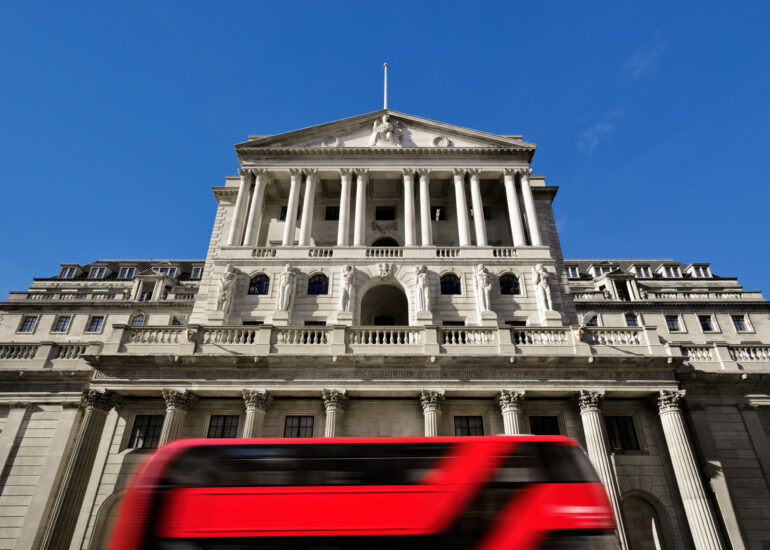Mortgage lending stood at £5.3bn in June, down from £8bn in May, while consumer borrowing rose during the month, Bank of England (BoE) data has revealed.
Despite the decline the BoE’s money and credit report shows that net borrowing of mortgage debt remained above its 12-month pre-pandemic average of £4.3bn.
Gross lending dropped to £25.4bn in June, down from £28.1bn in May, and gross repayments also decreased; down to £20.3bn from £21.2bn the preceding month.
Approvals for house purchases dropped to 63,700 last month, from 65,700 in May, below the 12-month pre-pandemic average up to February 2020 of 66,700.
Approvals for remortgaging also dropped with 44,000 in June, from 47,200 in May.
Reaction
Stuart Wilson, CEO of Air:
“In June, the UK mortgage market once again proved its resilience, weathering complex economic pressures to grow and even rise slightly above pre-pandemic averages for net borrowing. However, the outlook shows that the market still faces the combined challenge of a spiralling cost of living and rising interest rates.
“In the past, younger generations have often turned to the Bank of Mum and Dad for financial support to help them step onto the housing ladder. In 2022, with house prices continuing to rise, this is likely to remain the case for some families while others may need broader financial support or see their older relatives using their housing equity to boost their retirement income.
“As the UK’s economic environment evolves, it’s vital that older homeowners can access specialist advice for knowledgeable advisers they can trust so they can benefit from understanding all the financial tools at their disposal to support them and their families, for some this may include later life lending.”
Steve Seal, CEO, Bluestone Mortgages:
“With inflation reaching a 40-year high, it’s hardly surprising we’re seeing a dip in mortgage approvals. Add to this the cost of living crisis and the consequent strain on people’s personal finances, we expect a growing number of customers to be turned away from the mainstream mortgage market.
“For these individuals, it’s important to remember that hope is not lost. There are specialist lenders out there that can cater to their needs and have a range of solutions to help them climb onto or up the property ladder still. Ultimately, all lenders have the responsibility to ensure customers are pointed in the right direction so that they can make their homeownership dream a reality.”
Paul Stockwell, chief commercial officer, Gatehouse Bank:
“With the cost of living rising, record inflation and several months of consecutive interest rate hikes, it’s not surprising that the demand for mortgages has dipped. The short supply of homes and rising house prices over the last few years have also impacted property transactions as buyers look to delay purchases until market certainty returns.
“We are just concluding what is traditionally the busiest period for property purchases each year, and as mortgage market professionals and their clients go on holiday over the summer months, we would expect a slowdown in activity.
“It is also important to remember that year-on-year numbers are being compared to a period characterised by the Stamp Duty holiday, and appetite for purchase will naturally have seen a decline since this ended in June 2021.
“It’s key to stress that there is still a strong pipeline for future borrowing and we are gaining interest from new and existing borrowers despite the economic hurdles and supply issues. In the current climate, one marked shift has been a trend towards longer term fixes both for those looking for a mortgage or indeed to remortgage.”
Tomer Aboody, director of property lender MT Finance:
“It is not surprising that mortgage approvals for new purchases decreased in June as some of the heat comes out of the market. With improved supply levels helping satisfy buyer demand, the pace of house price growth is also likely to slow as more balance returns to the market.
“With the prospect of higher mortgage rates on the cards, buyers are taking advantage of the last remaining lower rates before the inevitable spike, with those remortgaging desperate to lock into a fixed-term mortgage for as long as possible.
“Consumer credit borrowing rose in June, deviating from the previous trend towards saving. Going forward, one would expect higher inflation and living costs to mean many will have to dip into savings in order to manage, with those who don’t have that buffer finding life increasingly difficult.”
Richard Pike at Phoebus Software:
Richard Pike, Phoebus Software sales and marketing director, says “There is no doubt that things are getting tougher and, as the slowing of the housing market is starting to show, things are only likely to get tougher. The Bank of England figures this morning also reports the almost inevitable rise in lending on credit cards as household finances are stretched ever thinner.
“The latest ONS report reveals that income to house price ratios are at their highest since 1999. However, the fact that house prices continue to rise, along with the number of properties going for above their asking price, reveals a sustained appetite for purchase. We just have to hope that whatever happens, both at the Bank of England and in Downing Street, in the coming months will be for the better. In the meantime, it’s not all doom and gloom as some would have us believe.”
Paul McGerrigan, CEO at fintech broker Loan.co.uk:
“There are strong signs the overheated property market is cooling after its hottest period in some time.
“Mortgage borrowing saw a marked drop in June, down to £5.3bn from £8bn the previous month.
“Another key indicator of the market settling is the consistent decline of mortgage approvals, in June this sat at 63,700, which has steadily ticked down from 73,800 in January.
“Sustained financial pressure on households is steadily having an impact and it seems we have reached a point where interest rates and future financial concerns are dampening demand. That said, we also have to acknowledge that 2021’s figures were artificially inflated with the government incentives put in place as we emerged from COVID.
“The role of the broker continues to be more important than ever to help clients find the right solution for the time.”
Imran Hussain, director at Nottingham-based Harmony Financial Services:
“Disposable income is taking a hammering and this situation will only worsen as people increasingly rely on credit cards and loans to stay afloat, which is what they’re clearly doing right now. The financial buoyancy aid of credit cards and loans can rapidly turn into a breeze block.
“As for savings, these will be a pipe dream for many as a lot of people’s utility bills are higher than their mortgage payments, which is crazy. On the mortgage front, the people speaking to us now are super serious about remortgaging or buying.
“The window shoppers have gone since, with rates and inflation rising, now is not the time to buy unless you are committed. In the months ahead, expect house price growth to slow as borrowing becomes more difficult due to inflation and lenders tighten their criteria.”

Andrew Montlake, managing director of the UK-wide mortgage broker, Coreco:
“The level of consumer credit being taken out shows all is not well in the economy. People are borrowing more and saving less, which says all you need to know about the growing distress among households.
“June was still fairly busy on the mortgage front but we may be seeing the beginning of nerves in the mortgage approvals data as the cost of living crisis takes grip. Where we are seeing a lot of activity is in remortgages.
“People are fixing for as long as they can to help mitigate the impact of soaring inflation. All people read about is rates heading north and that is driving them to act and act now. It’s a trend we expect to continue in the months ahead.”
Simon Webb, managing director of capital markets and finance at LiveMore Capital:
“The drop in mortgage borrowing by some £2.7bn heralds the move towards the slower time for house purchases during the summer months.
“However, combined with a drop by 2,000 of approvals for house purchases, these reductions may also reflect a growing nervousness in the market as interest rates rise.
“That said, at £5.3 bn, the level of borrowing still sits above the 12-month, pre-pandemic average up to February 2020 of £4.3 bn.”
James Miles, director of Exeter-based broker, The Mortgage Quarter: “Though disposable income is reducing amid the cost of living crisis, I am seeing people spend more on their credits cards to fund their lifestyles or simply to stay above water.
“That is very evident in this latest data. For now, many are borrowing to ‘keep up with the Joneses’ rather than to cover necessities, but I can see that changing further into the year as savings dwindle and the real effects of energy price, fuel and food price increases take hold.
“Then people will be borrowing to fund the basics. The amount that people can save each month has dropped off a cliff as this money is being spent on surviving. Over the next 12 months, I can see house price increases slow down as buyers will not be able to afford the higher monthly payment when negotiating their mortgage rate.
“This week alone, the two largest lenders, Halifax and Nationwide, are putting their rates up by a further 0.3%. I saw a client yesterday who explained it was much more important to understand what her monthly payment would be if rates reached 7% as this had been spoken about in the Conservative leadership debate and she is very anxious about moving. We are likely to see property market activity reduce as a result.”
Samuel Mather-Holgate of Swindon-based Mather & Murray Financial:
“People are needing to use credit cards and personal loans to finance the most basic of requirements in some circumstances, and we should expect things to get worse as inflation heads even further north and interest rates climb as a way to control inflation. The next 12 months will inevitably bring a recession to the UK.
“This will result in stagnant property prices or a shallow downturn. Refinancing will become less easy and homeowners could feel some real pain if they have high levels of personal debt.”
Jamie Lennox, director at Norwich-based mortgage broker, Dimora Mortgages:
“We’re seeing more borrowers with a greater reliance on revolving credit such as credit cards to fund their everyday living off the back of the cost of living crisis. This could soon become a slippery slope for many who may struggle to find their way out of that debt.
“The number of people in financial difficulty will soon start snowballing. Many people are already in difficulty but are burying their heads in the sand or trying to fund everyday living on credit cards, which could end in disaster.”
Imogen Sporle, head of term Ffnance at London-based Finanze:
“Secured loans, or ‘second charges’, are becoming more common for debt consolidation. Many households are having a difficult time and are using secured loans to consolidate unsecured and credit card debt so they can repay this over a longer term and create more disposable income to spend on the bare necessities.
“Almost every credit report I see now has some form of adverse credit. It is a rare and wonderful surprise to see someone with perfect credit and I know many adverse credit brokers who are absolutely overrun with applications at the moment where most of the credit scores are 200 out of 1000. There’s no question now that more people will be entering a period of real financial difficulty.”
Fanny Snaith, a Cheltenham-based certified money coach:
“I’m seeing more and more people wanting to increase their mortgage to clear their debts. They think that if they can secure a lower mortgage now and clear the decks of debt, they can move forward with a clear head. Robbing Peter to pay Paul comes to mind but for some this seems the best option. Hang on to your hats for the winter months as the financial climate could become brutal. I fear for those whose mortgages are near review as they will feel a significant shock.”

John Phillips, national operations director at Just Mortgages:
“Although this may at first seem like a significant fall in net lending in June we should remember that there was a considerable spike in May and volumes are still well above the pre-pandemic average.
“In an environment of high inflation, rising interest rates and a cost-of-living crisis the mortgage market is showing tremendous resilience. Despite fears of a cooling housing market, feedback from our brokers across the country is that mortgage demand remains high and, with relative low stock levels, house prices remain robust.
“We are expecting borrowers’ ability to satisfy lenders’ affordability rules to be affected by increases in household spending on fuel, food and energy but this has yet to materialise is any significant way and there is still an appetite from borrowers to secure a deal before further rate rises. However, completion times are being stretched and so we should expect a lag in housing transactions over the coming months.”
Sabrina Hall of Lichfield-based Kind Financial Services:
“Recently, I’ve had a few first-time buyer clients contact me to say that they are really struggling to save for the deposit at all because of the increased cost of living. The amount that they were previously putting away for savings is being eaten up by increased energy, petrol and food bills.
“This is bound to have a trickle down impact on the housing market at some point as a shortage of first-time buyers into the market causes problems for the entire property market. There’s every chance mortgage activity will drop off during the second half of the year as the cost of living crisis scuppers affordability.
Lewis Shaw, founder of Mansfield-based Shaw Financial Services:
“We’ve seen a surge in homeowners wanting to remortgage in the middle of fixed rates and pay their early redemption charges, as they clamber to reduce their balance sheets and lock into 5-year deals. The reason why is that we’ve not even begun to see the true impact of the cost of living crisis. I fear that with two more energy price cap rises in October and January, rising mortgage rates and food price shocks already baked in, things will get very ugly.
“Undoubtedly, we’ll see rocketing use of credit cards and personal loans to try and make ends meet, along with a jump in payday loans. We’re already starting to see that now. This cost of living crisis will be far worse than the winter of discontent; at every stage, politicians have underestimated the impact this will have on millions of families, not just now but for years to come. Millions of households have no financial resilience thanks to a decade of real terms pay cuts and Tory austerity. Without a doubt, we’ll see massive spikes in repossessions accompanied by a spiralling mental health crisis, which will be the straw that breaks the camel’s back for our NHS. Politicians should heed the warning of Aristotle: Poverty is the parent of crime and revolution.”
Graham Cox, founder of the Bristol-based broker, SelfEmployedMortgageHub.com:
“It seems clear that this winter is going to be incredibly tough one for many people, particularly if it’s a cold one. At the moment, there’s no obvious end in sight to the energy crisis and January could see prices three times higher than a year earlier. My best guess is that by next summer we’ll be through the worst. But by then, we’ll have more debt, fewer savings and higher unemployment. Why on earth Rishi Sunak thinks it a good idea to raise taxes at a time like this is beyond me. With fuel, food, tax, energy and mortgage rates all going through the roof, it’s hard to see anything other than falling house prices. Shortage of housing stock or not, if people can’t afford to borrow as much, then property prices will fall.”




